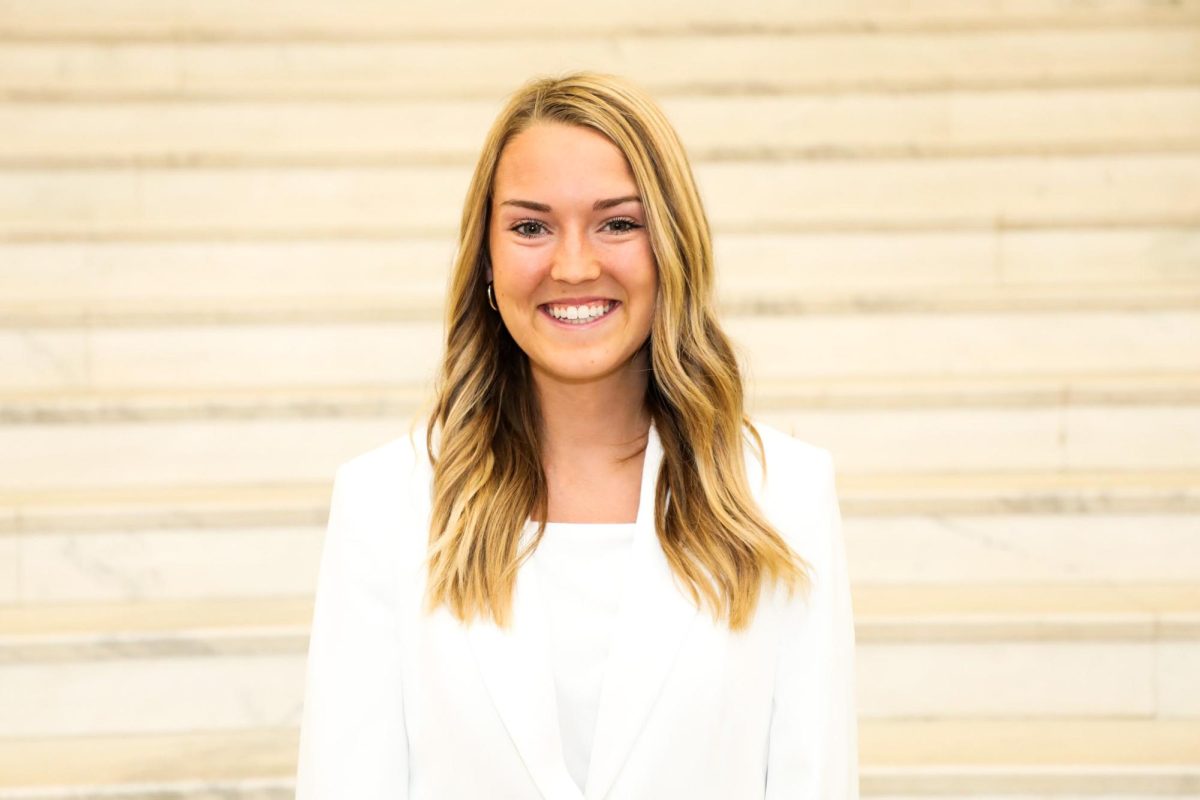When Professor of English Marion Larson had her son in 1991, Bethel had no maternal leave policy. She decided to put her three-credit classes in four-credit slots so the class would be ahead by the time she gave birth over spring break.
After those three weeks, her students started sending in essay drafts that she edited for three weeks. Then she came back to campus, baby in tow, to watch presentations. Later, she would keep bringing her kids to Bethel when their daycare or school was closed, or they were too sick to go to school but not sick enough to not come to campus and watch a movie on one of the Bethel Library’s VHS carts.
“I think it’s good for students to see the adults who work here doing life,” Larson said. “When I started here, there were very few married female faculty who were of an age where they might have been getting pregnant or having young kids at home. I certainly never had role models in my life for what it might look like to be a working mom, and I thought it was good for students to see that.”

At the November Faculty Senate meeting, Provost Robin Rylaarsdam announced a new parental leave policy that would include 12 weeks of leave for employees giving birth, those whose spouse was giving birth and those who are adopting. The announcement was supposed to take place at a faculty meeting the next day, but Rylaarsdam was too excited not to share. The new policy doubled the amount of leave previously given solely to the biological mother. For students, this means that faculty adding a baby to their family will not be in and out of classes.
Rylaarsdam, Professor of Psychology Sherryse Corrow, Program Director for Nurse-Midwifery Katrina Wu and former Professor of Chemistry Ashley Mahoney worked on this new parental leave policy for two years. According to members, the task force wanted to create a policy more beneficial to the new parent, and the administration wanted to make a plan that would be easier for students by preventing instructor changes halfway through the semester. Now, instead of classes, faculty are assigned special projects based on their department and skills.
“The old policy, I would argue, wasn’t maternity leave,” Corrow said. “It was … short-term disability.”
In the old policy, the longer a faculty member worked at Bethel, the higher the percentage of pay they would receive (up to 90%) while on leave. Now, faculty are eligible for 100% pay after being a full-time benefits-eligible faculty member for 13 months and must commit to working at Bethel for 12 months after taking parental leave. A 12-week leave policy was also implemented this spring.
Mom, neuroscientist and Assistant Professor of Psychology Rachel Anderson didn’t teach any classes this semester, but was kept busy editing a manuscript by 2023 graduate Isabella Moechnig about their teams’ research on stress, involvement in four committees and groups and meeting one-on-one with students. Anderson still had a full schedule, especially when considering the additional sickness, including gestational diabetes, from being pregnant.
Anderson found out that she was pregnant in August. She assumed that she would teach a full course load in the spring and find other professors to lead her classes once she had her baby.
“Honestly, I was stressed out about how we were going to make it work not only financially but also from my department. Like, who was going to cover my classes, because everyone else was already going to be teaching, and it was just this complete unknown,” Anderson said.
Anderson is the first to use the new policy. She had her second baby, a girl named Emilia, April 14.
When she and the rest of the psychology department found out about the new plan, Anderson’s neurology classes were canceled because she was the only person who could teach it. Other courses that were supposed to be co-taught, such as “Consciousness,” went down to one professor and her co-workers taught overload.
Another faculty member who advocated for women to get paid leave, Associate Professor of Mathematics Emerita Patrice Conrath, created the Maternity Advocate position, which is not currently set to be filled. She also worked for pregnant women to have access to disability parking spaces. During one of her pregnancies, she went into preterm labor and a security officer had to drive her to her car.
“He was very nervous, and asked if I was going to have the baby in his car. I said no, but enjoyed the squirm since I had been denied parking help,” Conrath said.
The previous policy allowed new mothers to take six weeks of short-term disability at partial pay for those who gave birth vaginally, and eight weeks for cesarean section recovery. There was also an optional six more weeks of unpaid time off through the Family and Medical Leave Act, which guaranteed a job when the faculty member returned. Families would have to weigh whether they could afford the mother to take the additional six weeks of FMLA at no pay or whether to pay for childcare, which is more expensive for infants. The 2023 Minnesota Child Care Cost Modeling Report estimates that infant care costs more than $23,000 a year in an urban setting.
For Anderson’s first pregnancy, she got one week at full pay, six weeks at 50% pay and an optional six weeks unpaid. Corrow took the six weeks of short-term disability.
When the task force put together the new parental leave policy, they wanted to include adoption.
In 2010, Associate Dean of Academic Inclusive Excellence and Professor of Philosophy Sara Shady found out that she needed to pick up her adoptive son from Ethiopia with three weeks’ notice. Had it not been July, she would have been given one week to do so: not enough time to make the trip. Upon return, her days were filled with helping her son learn English, bonding with him and making sure he knew that he wouldn’t be leaving.
Adopting is just as busy for parents as biological birth. For Shady, both when she adopted and when she had her biological son, she found ways to maintain benefit status while teaching a lighter load. At that time, a woman had to negotiate leave based on the department in which she worked.
“That just shouldn’t be that way because, both times, I ended up with better deals than I know the other women got, and I felt bad about that because it wasn’t fair,” Shady said.
The updated policy also includes fathers, which gives them time to bond with their children and support the mother.

“Men need to take an active role in parenting. That would be a lot harder if they’re working full-time and then need to sleep at night. They’re just not going to have the opportunity to bond with their children in a way that mothers get to,” Anderson said.
While Anderson’s husband Travis Cameron does not work at Bethel, he does get six weeks of paid paternal leave from his job as Chief Revenue Officer & Associate Athletic Director at the University of Minnesota. For Anderson, this means that she can take some breaks as primary caretaker — like Cameron taking the baby while she takes a shower.
Larson understands that pregnancy is unpredictable, and flexibility is required when writing policies about adoption and pregnancy.
According to Chief Human Resources Officer Michael Freer, “Our benefits and related policies, including around family leave, are designed to be competitive and honor the significant contribution our employees make to Bethel, in addition to meeting legal requirements. Employees’ health situations are personal and often unique. Our office works with employees and their supervisor[s] to address health issues that impact their work, including details around life events such as pregnancy.”
In the end, faculty agreed that this is an improvement from the previous policy. Staff also received an updated policy with 12 weeks of leave.
Now that her daughter has been born, Anderson is spending her time editing the “Discussion” section of the manuscript Moechnig is writing while her baby takes naps for two or three hours at a time.
“It’s all hands on deck,” Anderson said. “I’m the sole source of nutrients for her, so I’m kind of stuck to her and she’s stuck to me.”






















